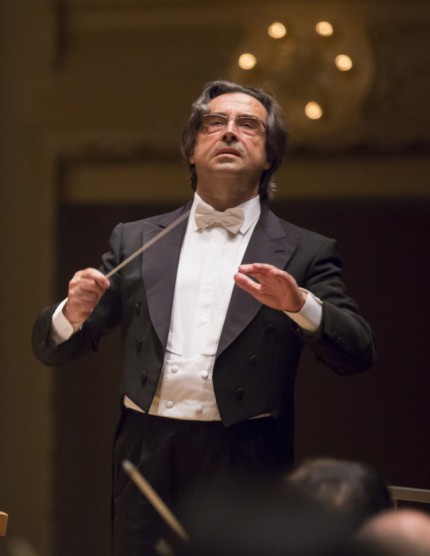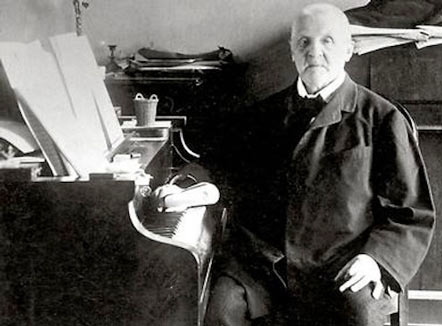Muti, CSO close anniversary season with majestic Bruckner

The Chicago Symphony Orchestra’s 125th anniversary season is drawing to a close this weekend. On Thursday night Riccardo Muti led the orchestra and CSO chorus in an all-Bruckner program that put an effective and resounding coda on this retrospective season.
In a brief pre-concert introduction, Muti dedicated the evening’s performance of Bruckner’s Te Deum to CSO members past and present, honoring “all the musicians who have made this orchestra great for 125 years.”
Both Bruckner’s Symphony No. 9 and his Te Deum were given their U.S. premieres by Theodore Thomas and the CSO, in 1904 and 1892, respectively (the Te Deum debut took place on tour at Cincinnati’s May Festival). CSO founder Thomas presented four Bruckner symphonies in the orchestra’s earliest years, a Bruckner tradition continued by Frederick Stock and on through Sir Georg Solti and Daniel Barenboim (both of whom recorded complete Bruckner/CSO cycles) to Bernard Haitink and Riccardo Muti today.
Muti’s Bruckner inhabits a terrain closer to the boldly dramatic approach of Solti than Barenboim’s more searching and spiritual style. In the long opening movement, there was little sense of the mystery Bruckner calls for in Muti’s firmly outlined direction, though the CSO music director steered a flowing yet flexible pulse through the long arching paragraphs. The triple-fortissimo tuttis had extraordinary sonic impact, yet for all their power, textures were refined and concentrated, with the nine horns never harsh or blaring. There was compensating Viennese warmth in the contrasting sections, with the strings conveying the pastoral lilt and off-center gemütlichkeit. After the ferocity of the final orchestral explosion, the pleading, broken string phrases had a touching, almost human quality.
The tension did not let up in the ensuing Scherzo. Rarely will one hear this music played with such relentless force and malevolence, the jabbing oscillations of the main theme manic in their violent intensity. The bucolic whimsy of the light-footed trio provided requisite contrast if cold comfort.
Bruckner did not live to complete the final movement of his Ninth, yet the majestic Adagio contains such elevated music it’s hard to imagine what could possibly have followed it. Muti was most inspired in this movement, judging the ebb and flow with great skill and sensitivity.The dark, elegiac tone of the four Wagner tubas emphasized the valedictory expression. There was a sense of unhinged dislocation in the harsh orchestral outbursts and piercing wind chords, barely mitigated by the radiant, trumpet-led theme, which seems to be striving for an unobtainable higher region of spiritual safe harbor.After the grinding dissonance of the final peroration, Muti and the musicians charted the final bars from bleak desolation to an affecting, fragile solace at the glowing coda.
Apart from some wavery flute playing and a couple fleeting ensemble slips, the orchestral playing was beyond reproach with especially stellar contributions from bassoonist Keith Buncke, horn Daniel Gingrich, guest oboist Richard Woodhams (principal of the Philadelphia Orchestra) and the rest of the winds and brass.
The Te Deum is an earlier work, which Bruckner suggested could be played as the finale of his Ninth Symphony should he not live to complete it. That sort of took place Thursday with the choral setting following the symphony after intermission.
Yet the optimistic Te Deum, grandly scored for chorus, vocal quartet and large forces, is a completely different, less complex work, one that stands strongly on its own as a work of confident religious exultation, reflecting the compose’s deep, Roman Catholic faith.
Erin Wall’s bright, resplendent voice sounded glorious, making one wish Bruckner had given the soprano soloist more to sing. The tenor gets most of the duties here and Steve Davislim assayed the challenging high tessitura with security, displaying a plangent tone and expressive poise. In their less showy assignments, Okka von der Damerau was the capable mezzo-soprano and bass-baritone Eric Owens proved luxury casting, handling his subterranean lines with refined aplomb.
The chorus is the Te Deum’s main protagonist and the gifted men and women of the CSO ensemble were at their finest under Duain Wolfe. The chorus sang with well-blended tone and daunting dramatic power as well as sensitivity to the text.
Muti kept a firm sense of pulse as he guided the varied tempos of the unfolding narrative and built the music inexorably to its soaring final bars. With the heaven-storming CSO chorus, pealing brass and sonorous organ creating a massive wall of sound in Bruckner’s thrilling coda, one could hardly imagine a better way to ring down the curtain on this anniversary season.
The program will be repeated 8 p.m. Saturday and 3 p.m. Sunday. cso.org; 312-294-3000.
Posted in Performances





